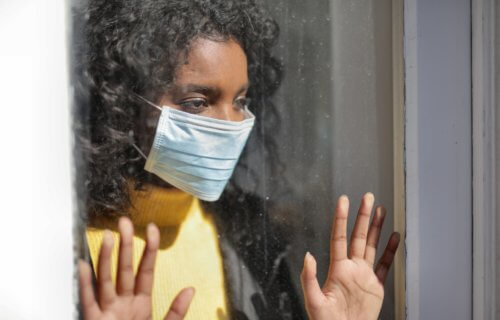ABERDEEN, Scotland — The prolonged COVID lockdowns have seemingly blurred people’s perception of time, a time-bending new study explains. Participants in the study exhibited a notable frequency of errors when attempting to recall the order of major events during the 2021 lockdowns. Moreover, the inaccuracy in recollection was proportionate to the severity of anxiety and depression among participants, researchers in the United Kingdom say.
Interestingly, these findings echo previous studies conducted on inmates serving extensive prison sentences. Professor Arash Sahraie, a co-author of the study, postulates that the absence of customary life events, like birthday parties, during the lockdown may be contributing to this ambiguous recollection of this stressful period.
Prof. Sahraie, from the University of Aberdeen, notes that the task of recalling past events becomes increasingly challenging as more time passes. Additionally, he points out that people’s activities and emotions can affect their perception of time’s passage. The substantial changes in activities and emotional states resulting from social isolation during COVID-19 lockdowns have had a pronounced effect, confirming prior research illustrating that the pandemic has led to distortions in people’s perception of time.
Scroll down to see 3 other ways COVID lockdowns disrupted society

Motivated by prior research and clinical reports detailing patients’ diminishing ability to provide accurate medical histories, the Scottish team sought to expand our understanding of how the pandemic impacts the perception of time.
To achieve this, they conducted an online survey in May of 2022. The team tasked 277 participants with identifying the year of several significant recent events, such as the finalization of Brexit or Meghan Markle’s induction into the royal family. Participants also underwent standard assessments concerning factors linked to mental health, including measures of boredom, depression, and resilience.
As the team expected, Prof. Sahraie reports that participants’ recall of relatively older events was less accurate. However, the accuracy of their recall for events from 2021, just a year prior to the survey, was surprisingly comparable to their memory of events from three to four years ago.
This suggests that participants struggled to remember the order of events that coincided with the COVID pandemic. Moreover, those who made more timing errors also demonstrated higher levels of depression, anxiety, and physical mental demands during the pandemic, while exhibiting lower resilience.
Notwithstanding, the research, published in the journal PLoS One, indicated that boredom did not have a significant relationship with timeline accuracy.

You might also be interested in:
- How ayahuasca works: Psychedelic tea taken by Prince Harry, Aaron Rodgers alters perception of reality
- Missing quarantine? 1 in 3 young people say they were HAPPIER during pandemic lockdowns
Prof. Sahraie notes that these findings are similar to those previously reported for prison inmates. The researchers propose that accurately recalling the timing of events necessitates the “anchoring” of significant life events, such as birthday celebrations and holidays, which were conspicuously absent during the lockdowns.
“Our paper reports on altered timescapes during the pandemic. In a landscape, if features are not clearly discernible, it is harder to place objects/yourself in relation to other features. Restrictions imposed during the pandemic have impoverished our timescape, affecting the perception of event timelines. We can recall that events happened, we just don’t remember when,” the study authors write in a media release.
3 ways lockdowns disrupted society as we know it:
The birth rate plunged:
According to a 2022 study, couples were having less sex due to lockdown measures, with the United Kingdom among the countries feeling the biggest impact. Births were down by 13 percent in England and Wales, and 14 percent in Scotland. Researchers say this could have “long term consequences” for aging populations. The Swiss team analyzed data from 24 European countries covering periods immediately before and after the first wave of COVID-19. Overall, the drop in newborns was 14 percent in January 2021, nine to 10 months after the first virus peaks and lockdowns.
A rise in eating disorders:
In 2021, researchers from Anglia Ruskin University noted that recent lockdown measures appeared to be contribute to an increase in eating disorder-related symptoms.
In the summer of 2020, study authors analyzed the behaviors and attitudes of 319 local health club members with an average age of 37. Each volunteer filled out an “eating attitudes” test. That assessment asked them to indicate how strongly they agreed with statements like “I am terrified about being overweight,” “I have the impulse to vomit after meals,” and “I feel extremely guilty after eating.”
In comparison to similar research conducted in 2019, the average scores for the 2020 eating attitudes test were much higher. Researchers said this suggests higher levels of unhealthy conditions like bulimia and anorexia.
Cancer research derailed by nearly 2 years:
A 2021 report found that advances in cancer research suffered due to COVID-19. With less funding and quarantine mandates, a team from the Institute of Cancer Research in London said some cancer breakthroughs are now two years behind schedule.
“The coronavirus pandemic has posed the greatest threat to cancer research in generations,” Professor Paul Workman says in a release.
With social distancing rules in place, researchers had to limit the number of people who could occupy laboratories. They even had to avoid commuter peaks while taking public transportation. The ICR team said that without funding, advances in fighting cancer may face even further delays than the current estimates of 17 months to two years.
South West News Service writer Stephen Beech contributed to this report.


I LIKED YOUR VIDEO STORIES A COUPLE TIMES A WEEK BUT HAVE NO USE FOR NUTSHELL. HOW CAN I GO BACK TO WATCHING THE VIDEOS? SITE DOESN’T GIVE ME WAY TO SUBSCRIBE. YAHOO ALSO LOST MY ACCOUNT AND WON’T HELP ME SO MY EMAIL ADDRESS HAS CHANGED. I JUST WANT THE VIDEO EVERY WEEK OR WHENEVER YOU SENT IT OUT. SORRY TO BE SO PICKY BUT I ALWAYS END UP TOSSING THE NUTSHELLS.